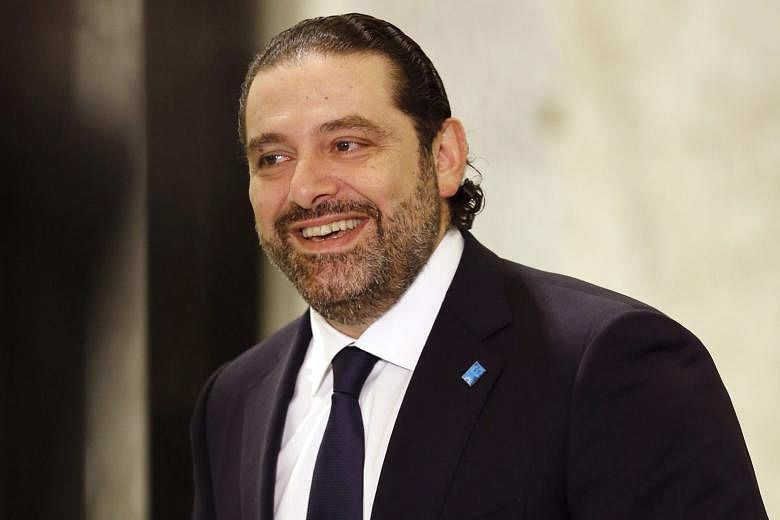Prime Minister Saad al-Hariri, Lebanon's erstwhile pragmatic dealmaker, appears to have become yet another pawn sacrificed in an escalating proxy war between two of the most extreme regimes in the Middle East.
On one end is Iran, patron of the region's underprivileged Shi'ites, and on the other is Saudi Arabia, the Sunni protector of Islam's holiest sites Mecca and Medina.
Mr Hariri's biography embodies the dangers that this rivalry represents for the whole region.
His father Rafik Hariri, born to humble origins in Lebanon, built a huge business empire after he emigrated to Saudi Arabia and befriended its royal family.
While Lebanon was self-destructing in a bloody civil war that lasted decades, the senior Mr Hariri made billions abroad that bought him recognition and influence back home.
When he helped end the civil war with Saudi backing in 1990, it cemented his standing as one of Lebanon's most important politicians, much to the chagrin of the country's old elite and the upstart Hizbollah, a militia founded and funded by Iran's Revolutionary Guards to curb Western influence in Lebanon.
Eventually he became too successful, and Syria and Iran decided to get rid of him. His death in a massive car bomb attack by Hizbollah operatives in Feb 2005 thrust his son Saad on to the world stage.
Born in 1970 in Riyadh, Mr Hariri is the second son of his father's first Iraqi wife. He enjoyed an international upbringing. He studied in Lebanon, France and Saudi Arabia, and later graduated in business administration from Georgetown University in Washington.
Fluent in English, French and Arabic, he is equally comfortable with "an American-style approach" towards American guests as he is hosting "more traditional Arab visitors" in a "Saudi demeanour", according to a former US ambassador.
He never intended to enter politics, but his father's assassination forced his transformation from businessman to national leader.
Endowed with an "impressive personal charisma as a public speaker", according to foreign diplomats, the younger Mr Hariri won elections twice and formed a movement that would use the political momentum of his father's murder and his own Western backing to end Syria's decades-old occupation of his country in 2005.
Four years later, after earning his spurs as a local politician, Mr Hariri became Prime Minister, just like his father had been.
Some describe him as "prone to quick anger, especially when facing criticism", and someone who "tends to sulk and cut off discussions".
But even though he expects loyalty and political support "as his natural due", he has repeatedly demonstrated remarkable political pliability. To stave off national crises, he even formed two Cabinets with Hizbollah, his father's murderers.
That was certainly not due to a lack of deference: He reserved the chair at the head of the Cabinet's table for a portrait of his late father.
But he understands the balance of power in his country, where the Iranian-backed militia outguns the national army. So even while he was beholden to Saudi interests - most of his estimated US$1.1 billion (S$1.5 billion) wealth stems from dealings with the Saudis - he knew when to defer to Iran and Syria, even though he never kowtowed to them.
The Saudis, lacking military levers in Lebanon, supported Mr Hariri grudgingly and hoped he could rein in Hizbollah politically. But a change of guard in Riyadh brought with it a change of foreign policy and expectations.
The Sauds of old were content to let their money do the talking and others, their fighting. But new Crown Prince Mohammed bin Salman, often known by his initials MBS, charts a much more activist, confrontational and risky course.
He has led a crackdown against Shi'ites in the kingdom, arrested hundreds of political rivals under trumped-up charges of corruption, intensified Saudi support for Syrian rebels, and tried to win over key Shi'ite figures in Iraq to weaken Iran's predominance there. And, he has led his country into Yemen's bloody civil war to fight the Houthi rebels, a perceived Iranian proxy.
With Saudi-Iranian tensions thus rising, Mr Hariri's approach of balancing Iranian and Saudi interests in his own country, allowing Hizbollah significant political gains, ran afoul of MBS. So he pulled the rug out from under Mr Hariri, forcing him out of office and possibly into involuntary exile.
What comes next remains an open question. According to French President Emmanuel Macron, MBS agreed to let Mr Hariri go to be a "guest" of the French government in Paris, suggesting that Mr Hariri will remain exiled in France and that MBS indeed controls his movements.
With this pragmatic dealmaker removed from Lebanon's delicate political equation, two options seem to be the most realistic: a prolonged political stalemate in a country already close to economic collapse, or an escalation of sectarian tensions that could result in open violence.

